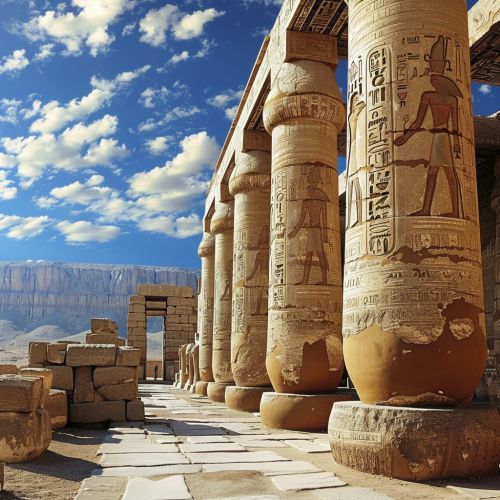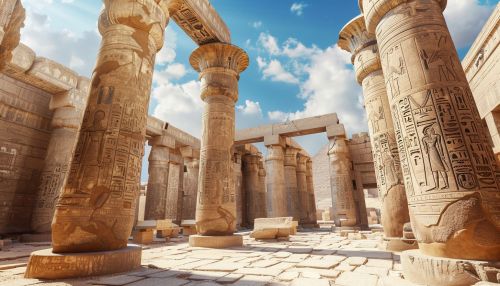Egyptian Religion
Overview
The Egyptian religion was a complex system of polytheistic beliefs and rituals which were an integral part of ancient Egyptian society. It centered on the Egyptians' interaction with many deities believed to be present in, and in control of, the world.


Beliefs
The Egyptians had a rich and complex set of beliefs that were central to their culture. They believed in a multitude of gods and goddesses, each of whom had their own role in maintaining peace and harmony in the universe.
Polytheism
The ancient Egyptians were polytheists, with the number of deities they worshipped running into the thousands. Each deity had a specific role in the cosmos, and their nature and character were defined by that role.
Ma'at
Ma'at was the ancient Egyptian concept of truth, balance, order, harmony, law, morality, and justice. Ma'at was also personified as a goddess regulating the stars, seasons, and the actions of both mortals and the deities.
Afterlife
The Egyptians had a complex and detailed understanding of the afterlife. They believed that life on earth was only a small part of an eternal journey, and that death was just a transition to another state of existence.
Practices
Religious practices were deeply embedded in the lives of Egyptians and were often a part of daily routines.
Rituals
Rituals were a key part of Egyptian religion. They were performed by priests and ordinary people alike, and were seen as a way of communicating with the gods.
Temples
Temples were the main places of worship in ancient Egypt. They were seen as the homes of the gods and goddesses, with the priests and priestesses serving as their servants.
Festivals
Festivals were a major part of Egyptian religious life. They were times of great celebration, when the gods would be honored with feasts and processions.
Deities
The Egyptian pantheon was populated by gods who had a wide variety of roles and associations.
Ra
Ra was the sun god, one of the most important deities in ancient Egypt. He was often associated with the pharaoh and the pharaoh's divine authority.
Isis
Isis was a goddess who represented the ideal mother and wife. She was also the patroness of nature and magic.
Osiris
Osiris was the god of the afterlife, the underworld and the dead. He was also associated with the cycle of Nile floods that Egypt relied on for agricultural fertility.
Influence on Society
Religion was a major component of ancient Egyptian culture and shaped their laws, politics, and daily life.
Law and Politics
Religion was deeply intertwined with the law and politics of ancient Egypt. The pharaoh was considered the representative of the gods on earth, and laws were often seen as divine mandates.
Daily Life
Religion also played a significant role in the daily lives of Egyptians. They would offer prayers and offerings to the gods for protection and blessings.
Decline and Legacy
The ancient Egyptian religion gradually declined during the Roman period, and was replaced by Christianity and later Islam. However, its legacy can still be seen today in modern religions and cultural practices.
